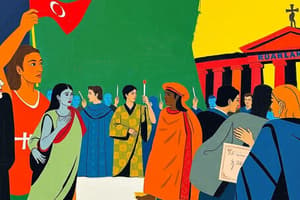Podcast
Questions and Answers
What principle underlines the idea that the people are the source of all political power in Roman thought?
What principle underlines the idea that the people are the source of all political power in Roman thought?
- Separation of powers
- Vox populi, vox dei (correct)
- Checks and balances
- The rule of law
Which of the following represents a key feature of the Roman system of governance?
Which of the following represents a key feature of the Roman system of governance?
- A single ruler with absolute power
- Complete reliance on the military for decision making
- A system of laws applied equally to all citizens (correct)
- An unfettered assembly with total authority
What was the purpose of the separation of powers in Roman governance?
What was the purpose of the separation of powers in Roman governance?
- To enhance military control over politics
- To prevent any one branch from becoming too powerful (correct)
- To create more powerful leaders
- To simplify the political process
How did the Romans contribute to the concept of representation in government?
How did the Romans contribute to the concept of representation in government?
Which of the following was a unique aspect of civic duty emphasized by the Romans?
Which of the following was a unique aspect of civic duty emphasized by the Romans?
Which term is derived from the Roman vocabulary associated with democratic governance?
Which term is derived from the Roman vocabulary associated with democratic governance?
What major step did the Romans take concerning the legal system?
What major step did the Romans take concerning the legal system?
Which principle emphasizes the importance of the people's voice in governance?
Which principle emphasizes the importance of the people's voice in governance?
What is the foundational concept of modern democracies that was advocated by both the Greeks and Romans?
What is the foundational concept of modern democracies that was advocated by both the Greeks and Romans?
Which principle established by the Greeks and Romans ensures that no single group has too much power?
Which principle established by the Greeks and Romans ensures that no single group has too much power?
In which form of democracy could all citizens directly participate in government, as demonstrated by the Athenians?
In which form of democracy could all citizens directly participate in government, as demonstrated by the Athenians?
Which ancient philosopher is known as one of the founders of political science and significantly influenced democratic thought?
Which ancient philosopher is known as one of the founders of political science and significantly influenced democratic thought?
What aspect of civic duty was emphasized by both Greeks and Romans as vital for democracy?
What aspect of civic duty was emphasized by both Greeks and Romans as vital for democracy?
What was a key feature of the Roman Republic's government structure?
What was a key feature of the Roman Republic's government structure?
Which of the following principles insists that laws take precedence over the whims of the majority?
Which of the following principles insists that laws take precedence over the whims of the majority?
Which statement reflects a significant contribution of the Romans to democratic governance?
Which statement reflects a significant contribution of the Romans to democratic governance?
Which contribution to democratic thought is attributed to Cicero?
Which contribution to democratic thought is attributed to Cicero?
How did the Romans influence the spread of democratic ideas beyond their borders?
How did the Romans influence the spread of democratic ideas beyond their borders?
Flashcards are hidden until you start studying
Study Notes
Contributions of the Romans to Democratic Government
- Popular Sovereignty: Romans established the belief that political power originates from the people, embodied in the phrase "vox populi, vox dei" which translates to "the voice of the people is the voice of God."
- Rule of Law: Introduced a legal system that equally enforced laws on all citizens, contrasting previous hierarchical power structures.
- Separation of Powers: Divided government into legislative, executive, and judicial branches, creating checks and balances to limit the power of any one branch.
- Representation: Citizens elected representatives to make decisions on their behalf, facilitating participation in governance without requiring direct assembly attendance.
- Citizen Army: Promoted the concept of civic duty where all citizens were expected to serve in the military, fostering patriotism and communal responsibility.
- Legacy of Vocabulary: Introduced important democratic terms such as "senate," "consul," and "tribune," which stem from Roman governance structures.
- Cultural Influence: Played a pivotal role in disseminating democratic concepts to other regions, notably influencing the political systems in Britain and France.
Contributions of the Greeks and Romans to Democracy
- Source of Power: Both civilizations underscored the importance of the people as the ultimate source of governmental authority, a cornerstone of modern democracies.
- Majority Rule: Affirmed that decisions should reflect the will of the majority, a critical aspect of democratic governance.
- Checks and Balances: Recognized the necessity of preventing excessive power accumulation by any individual or group, implemented systems to maintain balance within government.
- Civic Participation: Advocated for active citizen engagement in political matters, encouraging voting, office-holding, and public discourse.
- Supremacy of Law: Promoted the principle that the law reigns supreme, even against majority opinion, ensuring justice and fairness in governance.
Specific Examples of Democratic Practices
- Athenian Democracy: Practiced direct democracy where male citizens actively participated in decision-making through assemblies.
- Roman Republic: Operated as a representative democracy with elected officials in a tripartite system comprising the Senate, Assembly, and Magistrates.
- Influential Thinkers: Philosophers like Aristotle laid foundational ideas about governance and democracy, while Cicero emphasized the rule of law as crucial to a just society.
Lasting Impact
- Greek and Roman contributions to democracy are enduring, influencing contemporary governmental systems around the world and remaining integral to democratic principles today.
Studying That Suits You
Use AI to generate personalized quizzes and flashcards to suit your learning preferences.




